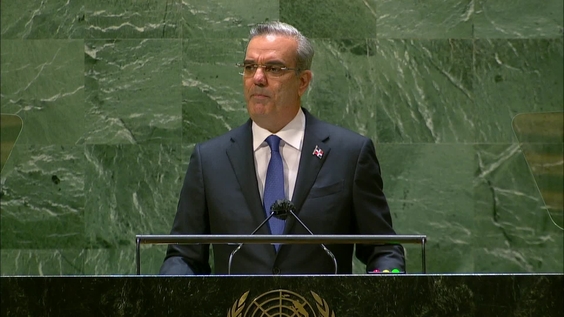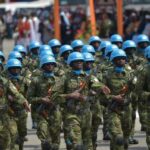Excellency Mr. Dennis Francis, President of the Seventy-Eighth Regular Session of the General Assembly, Excellency Mr. Antonio Guterres, Secretary-General of the United Nations, Ladies and Gentlemen,
As we move into the second decade of the 21st century, humanity faces both inherited challenges and new obstacles that demand action. We must view these calamities as opportunities that compel us to work together to overcome them. The Dominican Republic is committed to building a model of human development that is inclusive, fair, and sustainable. However, it is legitimate to ask whether we are truly on the path to achieving this.
The various crises brought about by climate change have had devastating impacts on our planet and societies, including droughts, rising sea levels, loss of biodiversity, and extreme weather events, among others. These impacts have generated an environmental debt that strongly threatens all the progress we have made in recent decades. As a developing economy with a negative carbon footprint, we are making our contribution to mitigating climate change by promoting the use of renewable energy. However, we recognize that this is just one step on the long road to sustainability, as we still have a significant dependence on fossil fuels.
Oil continues to be essential to us. I take this opportunity to draw attention to the practice of controlling the supply by exporting countries to keep oil prices high, to the detriment of importing countries. In this Assembly, representing both exporting and importing nations, we should discuss and approve a financial mechanism that ensures price stability for crude oil in medium and low-income importing countries like ours.
Important steps have been taken to address the climate emergency, such as the recent adoption of the Convention on the Conservation and Sustainable Use of Marine Biodiversity of Areas Beyond National Jurisdiction (BBNJ), which I will sign later today. However, many more decisive steps are needed, including the adoption of the Multidimensional Vulnerability Index (IVM) for application to all developing countries and the implementation of the Loss and Damage Fund to provide financial assistance to nations most vulnerable to the effects of climate change.
I also want to highlight the International Summit to be held in Antigua and Barbuda in May 2024 on Small Island Developing States (SIDS), in which our country will participate as a member of the preparatory committee.
Urgently needed is the creation of a favorable financing mechanism for middle-income countries to address the challenges posed by the achievement of the Sustainable Development Goals (SDGs 2015-2030). Lack of access to adequate resources was one of the reasons why most countries failed to meet the Millennium Development Goals (MDGs 2000-2015). As the Secretary-General has stated, the international financial system is “broken.” The Dominican Republic firmly believes in a comprehensive reform of the international financial architecture that benefits all countries equitably.
Another harmful effect of climate change particularly affecting our Caribbean region is the massive proliferation of sargassum seaweed. This algae, which devastates the Caribbean coasts, including those of the United States and Mexico, has serious economic, social, and environmental impacts, especially on tourism, which accounts for up to 75% of the economy in some Caribbean countries. The Dominican Republic has established a Multisectoral Committee to deal with this issue, and we hope that developed countries will contribute to the solution.
Mr. President,
One of the pillars of our commitment to achieving a fairer social contract and a more effective state has been, and always will be, the fight against corruption. The Dominican people have embraced it as a response to one of their main demands. Various international indicators of corruption perception confirm the progress my government has made in this regard. In a different context, I would like to reiterate before this Assembly the candidacy of the Dominican Republic for the UN Human Rights Council for the 2024-2026 period, in the elections to be held next month. This candidacy represents our firm commitment to the defense of human rights.
Distinguished colleagues,
When observing the island of Hispaniola from space – I encourage you to do so from your cell phones using Google Earth – a palpable and heart-wrenching difference is evident: one half is green and flourishing, corresponding to the Dominican Republic, which has prioritized the conservation and sustainable management of its natural resources. The other half, devoid of that rich forest cover, reflects the dramatic deforested landscape of Haiti. This natural border is not just a geographical lesson but a powerful reminder of what awaits the world if we continue to ignore nature’s warnings.
Ladies and gentlemen, Haiti today not only suffers an environmental tragedy but also political and social instability that could become a threat to the entire region. It pains me to recall the call I made to this General Assembly two years ago when I said, “Since this government took office, we have been announcing the possibility that the Haitian situation could spill over the borders of that country, becoming a factor of insecurity in the region. Hence, the need for this community of nations to finally assume the Haitian issue as one of the highest priorities requiring constant monitoring.”
Today, we see the harsh reality of that warning. A small group of Haitian individuals has resumed the construction of an illegal canal in Haitian territory to extract water from the Dajabón River in violation of the Dominican-Haitian border treaties. The international community must be aware that the Dajabón River originates in Loma de Cabrera, with most of its 55 km running through our territory before flowing into Manzanillo Bay in Montecristi. Only 2 km enter Haitian territory. It is in this small stretch on the Haitian side that the canal is being built.
The information we have indicates that this is a maneuver to control water by a small economic-political elite to profit from its sale to small producers in the area. The idea for this project was never officially communicated to the Dominican government, and no documentation regarding its scope, environmental impact, or the identity of its ultimate beneficiaries has been provided. Despite the limited information available, our analyses show that the project jeopardizes access to water for hundreds of Dominican and Haitian farming families downstream from where the canal is being built.
Furthermore, the project poses a flood risk to the CODEVI industrial park, located 300 meters downstream from the canal, as well as its 19,000 Haitian workers, and it also threatens parts of the border cities of Dajabón and Juana Méndez. Additionally, it would have harmful ecological effects, affecting the Saladillo Lagoon, one of the main wetlands in the Dominican Republic. Since April 2021, our government has repeatedly requested that Haitian authorities stop the unilateral and illegal construction of this project.
The Haitian government itself has stated that it is not a government project, but it has not stopped it due to institutional weakness and the public order and security crisis in the country. The situation has already resulted in delicate tensions on both sides of the border. Faced with this international illicit act committed by individuals in a part of the river located in Haitian territory, the Dominican government has been forced to take strong measures, such as closing the border with Haiti, to ensure national security and interests, as well as to protect our rivers, the environment, and agricultural production.
We do not seek, nor do we want, confrontation with the Haitian people, but we are indeed confronting uncontrollable actors who maintain insecurity in Haiti for their particular interests and who are now also conspiring against the stability of its government and the security of water resources.
Mr. President,
There is no doubt that the problem of Haiti is no longer confined to Haiti; it is now in the hands of the international community. For this reason, we firmly support the responsible stance of the President of the United States, Joe Biden, expressed yesterday from this same podium, and we will reiterate it now: the Security Council must urgently authorize the UN-backed security mission. The Security Council has already approved three significant resolutions, creating a sanctions regime, an effort to halt the illicit flow of weapons, and a call for the establishment of a multinational force to assist the Haitian national police, as requested by the Haitian government and the Secretary-General of this organization. We applaud the significant solidarity gesture of Kenya in leading the multinational force and that of Jamaica and the Bahamas in providing personnel.
I take this opportunity to express our special thanks to the President of Kenya, William Ruto, for his solidarity and humanitarian willingness to lead this mission in the pursuit of peace and stability for the Haitian people. We also urge all countries considering a role in this commendable effort to act with determination.
What is happening in Haiti is a breakdown of public order by criminal elements with no political or ideological claims. Therefore, responding to the Haitian authorities’ request for assistance by sending a multinational force is in line with the spirit and letter of the United Nations Charter and the mandate of this Organization in accordance with international law to ensure peace.
We are all aware that the peace process in Haiti must be accompanied by a social and political pact. In this regard, we commend the noble efforts being made by the eminent persons’ group of CARICOM to reach a political agreement that allows for the broadest possible legitimacy for the acceptance of a multinational force and the holding of fair, free, and transparent elections. In this regard, I want to acknowledge the efforts of Prime Minister Andrew Holness of Jamaica.
While thanking the Secretary-General for his work in addressing this crisis, we call on him to redouble his efforts to achieve the immediate deployment of the multinational force in Haiti. We also call on the Security Council to approve this resolution now because time has run out.
Mr. President,
For centuries of coexistence, often challenging, with the Haitian people, the Dominican Republic has shown clear evidence of unwavering solidarity. Haiti needs a lot. I want to reiterate our solidarity with the Haitian people, but without forgetting that our primary responsibility is to defend the interests of the Dominican people. We have always done so, we continue to do so, and rest assured that we will continue to do so because there is no Dominican solution to the Haitian problem.
Ladies and gentlemen,
Let us not wait for the next warning to become a chronicle of a foretold tragedy. May this moment in the Seventy-Eighth Regular Session of the General Assembly mark a rebirth in our collective determination to forge a safer, more inclusive, and sustainable future for Haiti and for all.
I make a final appeal: This global stage challenges us to act not only as individual nations but as a united collective with a shared vision and common purpose. History will judge us not only by the words we utter in these sacred halls but, more crucially, by our actions in the realm of reality. Let us not fail the future.
September 20, 2023.







